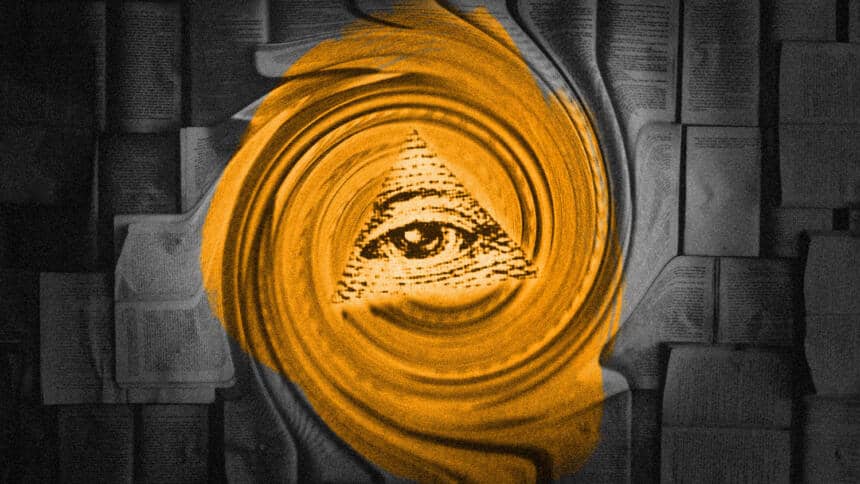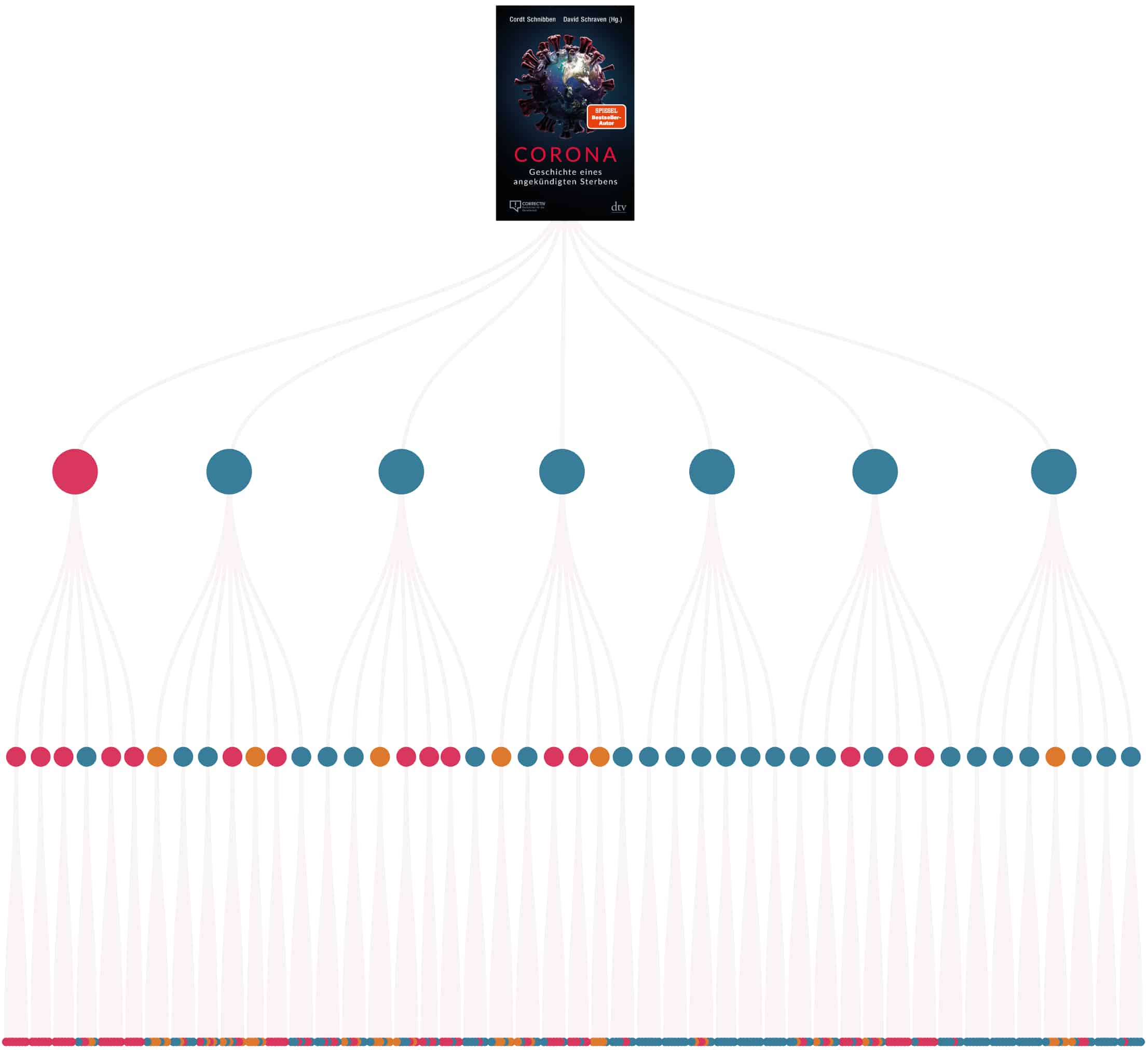
If you seek advice from the world’s most potent bookseller, you will quickly find disinformation suggested. Our research shows: Amazon is a slingshot for conspiracy myths – including the corona pandemic.

No bookseller in the world is as powerful as Amazon. But when it comes to serious book recommendations, Amazon is anything but top class. The platform praises conspiracy narratives, anti-Semitism and disinformation as well as scientifically based non-fiction books. Amazon, one of the most valuable companies in the world, not only has these books in its range, but its algorithms also make them prominently in front of customers’ noses.
This poses a social danger. Not only right-wing terrorists like those of Christchurch and Hanau refer to conspiracy myths. The myths also connect the heterogeneous group of corona deniers: inside, thousands of people roamed Berlin last weekend and openly dreamed of “storming” the Reichstag building. In addition to neo-Nazis and Holocaust deniers, the protesters also included esotericists and vaccine opponents, such as the conspiracy ideologist Robert Kennedy Junior.
Two years ago, according to a study, Amazon held a significant share of the German book market with around 20 per cent. The platform’s recommendations, therefore, have a considerable impact.

The Amazon search for “Corona” – carried out without being logged in – showed several problematic books among the first search results in our test. In first place was a book with the title “Corona false alarm?”. The suspicion of a “false alarm” with around 850,000 reported deaths in connection with Covid-19 worldwide can undoubtedly be regarded as refuted. “The defining stylistic devices of this book are the whispering, the rhetorical question, the insinuation and the suggestion,” summarizes Deutschlandfunk Kultur. The author of the book, Sucharit Bhakdi, is at least open to conspiracy narratives, after all, he was interviewed by the conspiracy ideologist Ken Jebsen in April of this year.
One of the first search results on Amazon was a book by the Kopp publishing house, in which the State Office for the Protection of the Constitution of Baden-Württemberg saw “ideological and business proximity to right-wing populist and partly openly right-wing extremist or anti-Semitic political actors” as early as 2015. Already on the cover, it is claimed that a “totalitarian state” is being built in the shadow of the pandemic – a story that numerous conspiracy ideologies spread. Overall, several non-fiction books on the first search results page deny or doubt the epidemic, for example: “Corona: The pure lie”.
But it can be even more absurd: The first result of the search query “Flat Earth” in our test in mid-August is not a book that exposes the conspiracy tale, but one with the serious title: “The flat earth is the only truth”.

The Amazon search results for “Holocaust Lie”, a term for the anti-Semitic conspiracy narrative that questions the murder of millions of Jews, are similarly problematic. The first search result comes from the ideological conspiracy author Thorsten Schulte and is also advertised as a “bestseller”. The rapper Chris Ares, who is classified as right-wing extremist by the Bavarian State Office for the Protection of the Constitution, apparently liked his book so much that he sang a song about it and had Schulte appear in the music video. A horror scenario in the book is a future in which there are only people of colour and no more whites: a component of a thoroughly racist conspiracy tale about the supposed threat to a white “people”.
Amazon’s deficits are also evident in topics about which serious non-fiction books have been published for decades. The first search results for “cancer” include books on alternative healing methods and nutritional tips against the disease. This is not automatically disinformation, but it could lead patients to make potentially life-threatening decisions about their treatment.
Not only the Amazon search confronts readers: inside with questionable content. This can also happen on the product pages of well-known non-fiction books, using recommendations. That means: Even those who have already obtained detailed information and would like to buy a well-researched book, Amazon can tempt them to put some disinformation in the shopping cart after all. This is shown by our research, for which we have evaluated hundreds of book recommendations.
Amazon bans products that encourage hatred and violence – actually.
Amazon has strict guidelines on what can and cannot be sold on the platform. Accordingly, “products that encourage, incite or glorify hatred or violence against people or groups” are not allowed.” More generally, it says: “Do not list any products that could harm Amazon customers.” Not only are these rules very vague, Amazon also reserves the sole right to “decide which content leads to poor customer experience and remove it from the sale.”
These rules do not only exist in theory: In 2015, Amazon, along with many other German booksellers, removed Akif Pirinçci’s books from its range. The right-wing writer had said in a Pegida speech among other things: “Unfortunately, the concentration camps are currently out of order”; he also conjured up the conspiracy myth of the “Umvolkung “. Today Amazon is offering its books again.
Hundreds of recommendations analyzed.
Amazon doesn’t just make books with disinformation available to those who may be looking for them specifically. The platform even actively suggests them to customers, as our research and a sample show. This also happens under scientifically founded non-fiction books.
Anyone looking at a book on Amazon will find other books recommended in the “Discover other articles” section. Clicking on such a recommendation opens the corresponding product page, which then contains a new range of offers. Using Amazon’s suggestions for the non-fiction book “Corona: The Story of an Announced Dying”, we examined where the platform leads its customers with the help of reading tips. The non-fiction book appears as one of the first results in the Amazon search query “Corona”. A collective wrote it of 19 journalists from the Correctiv research centre.

Book recommendations based on conspiracy ideology are marked in red.
Recommendations from the spectrum of vaccination skeptics and opponents are highlighted in orange. Other books are marked in blue
We have evaluated a total of 355 recommendations that are directly or indirectly related to this book on Amazon. There were 97 different titles, some of which Amazon suggested several times. A circle in the diagram represents each book recommendation.
The 355 book recommendations examined are divided into three levels. The first level consists of the first seven Amazon recommendations for “Corona: story of one announced dying”.

The second level consists of the recommendations linked to these seven recommendations. Finally, we again recorded their recommendations – the third and lowest level in the diagram. We have thus simulated the possible click paths that Amazon customers can browse from recommendation to recommendation.
In order not to have to click on the recommendations manually, we wrote a program that did this task automatically. The data was recorded at the end of August without browser cookies or an Amazon login. It is also only to be understood as a sample because the compilation of Amazon recommendations can change at any time and can depend on other factors such as the location of the users.
We have classified all books based on a previously defined set of rules. Relevant conspiracy literature is marked in red in the diagram – i.e. books which, based solely on their product description and a reading sample, clearly spread so-called conspiracy theories that have already been discussed as such in traditional news media. Books that can be classified as vaccine-sceptical to vaccine-hostile based on the product description are marked orange.
Our evaluation shows: if you browse Amazon, the platform may lure you straight into a rabbit hole.
124 Recommendations for Conspiracy Literature
More than half of the reading tips examined refer to books with inappropriate content. In 124 cases, Amazon suggested books that are conspiracy ideological. Many of them also propagate right-wing extremist or racist narratives.
Immediately on the product page of the Corona-Buch der Correctiv-Journalist: Inside, Amazon suggested a title that connects government measures in the fight against the pandemic with the “New World Order”, an anti-Semitic conspiracy myth. The author also claims that aeroplanes sprayed “chemtrails” intended to influence the behaviour of people and that billionaire Bill Gates wants to “drastically reduce” the world population.
The second level of recommendation was followed by a title that promises revelations about a “forbidden truth about the two world wars” and “the existence of aliens”. On the third level of recommendation, Amazon suggested a book that should consist of the visions of one hundred seers. In his foreword, the author already links the First, Second and an announced Third World War with Zionism.
Two of these books were published by Jan Udo Holey, Jan Udo Holey himself wrote the third. The Federal Office for the Protection of the Constitution described him in a paper published in 2005 as a “right-wing extremist esoteric”. Holey also attributes the agency to a pioneering role in anti-Semitic conspiracy literature. The Mannheim public prosecutor’s office was investigating him for incitement to hatred, and some of his writings are on the index. His pseudonym Jan van Helsing appeared in our data set in connection with 37 Amazon recommendations.
From the second level of recommendation onwards, Amazon also suggested books by vaccination opponents and sceptics, a total of 56 times.
The spectrum ranges from critical reports about vaccine damage to radical vaccination opposition. At least some of the books are pseudo-scientific, for example, one that denounces a “vaccination illusion” and, for instance, belittles the poliovirus. While billions of people are hoping for an effective vaccine against the coronavirus, these Amazon recommendations sow doubts about vaccinations in general.
“This is how the company destroys the world”.
From the third level of recommendation, books on conspiracy and anti-vaccination are in the majority. This is no coincidence: clicking on such a book in the recommendations brings up even more similar books to light. This suggests that Amazon algorithms can recognize a connection between these books.
David Schraven is managing director of Correctiv and co-editor of the Corona book, which is linked to numerous conspiracy books on Amazon. Schraven sharply criticizes Amazon: “You do a lot of work and then the research is placed in the middle of the garbage that just looks for attention,” he told netzpolitik.org. Instead of enlightenment, hatred, stupidity and discord would be highlighted. “Amazon should think about whether this is such a great idea. This is how the company destroys the world. “
We also took our sample from non-fiction books on conspiracy myths, including “Fake Facts” by Pia Lamberty and Katharina Nocun and “Nothing is as it seems” by Michael Butter. In these cases, the Amazon recommendations led to disinformation a little later: Only in the third level of the submissions did books on conspiracy ideology appear – they are only three clicks away from the book with which we started the sample.
One-time exposure to conspiracy myths can change behaviour
Research by social psychologists from Great Britain suggests what serious effects such Amazon recommendations could have. At the University of Kent, study by Daniel Jolley and Karen M. Douglas showed that even one contact with conspiracy narratives could make a difference.
The researchers presented 60 people from the USA with a text with fabricated claims about the adverse effects of vaccinations. The test subjects were then asked to imagine having a child named Sophie and to answer, among other things, whether they would have this girl vaccinated. And indeed: people who were confronted with the conspiracy stories were less willing to have Sophie vaccinated than people in a control group. Most of the encouragement to vaccinate came from a third group who had previously read a text that refuted conspiracy stories by those who opposed the vaccination. As the study published in 2014 found, vaccination sceptics were also more suspicious of authorities.
The social psychologist Jolley also warns about the effects of the Amazon algorithms, which recommend books by anti-vaccination users alongside serious non-fiction books. “There is no doubt that belief in such narratives can grow stronger when people are repeatedly exposed to them. This, in turn, can affect their behavior. “
Recommended books could also reinforce a conspiracy ideological worldview of users. “It is certainly possible that when confronted with several book recommendations on a certain topic, the impression arises that there is a consensus that actually many people and organizations share.” This, in turn, could encourage people to continue to deal with such content. “Amazon has the same responsibility as other social media platforms to act ethically,” says Jolley.
Attacks like the one in Hanau on February 19, 2020, or in El Paso on August 3, 2019 show how conspiracy narratives played a role in the radicalization of terrorists. In these and other cases, the perpetrators legitimized their violence, among other things, with conspiracy myths. Stories like QAnon can lead people to believe that sinister groups are secretly doing evil against the population. A perceived threat that can put conspiracy believers under pressure to act against it and commit an act of violence. The FBI also warned against it.
Amazon doesn’t want to answer any of our questions.
We emailed the results of our research to Amazon and sent a list of ten questions. Among other things, we wanted to know whether the group was aware of the extent of right-wing extremist and ideological conspiracy content in its search results and recommendations. We also asked how Amazon is curbing the circulation of these books. The company didn’t want to answer a single one of our questions.
That is why we do not know whether Amazon sees itself as responsible if customers damage their health through top search results and recommendations, for example, because they have read books that are hostile to vaccines. Or when customers radicalize themselves politically through right-wing extremist books. Amazon also did not want to say how the suggestions in the “Discover other articles” section came about.
In addition to a reference to the general guidelines, the company only let a spokeswoman say: “We are investing a lot of time and resources to ensure that our guidelines are followed and are removing products that do not comply with our guidelines. In addition to our proactive measures, we also immediately check every notification that we receive. “
In our case, we can confirm that Amazon checks clues: Amazon wanted to know exactly which products were shown to us in the search queries “Flat Earth”, “Holocaust Lied” and “QAnon”. We have sent corresponding screenshots to the press office. But that has not changed anything so far. Users still get to see conspiracy myths with these search terms.
All of this should please right-wing extremists and conspiracy ideologues very much. The conspiracy author Jan Udo Holey smugly comments on Amazon how well the platform helps him to spread his books. “Amazon makes it possible for everyone to order my books quickly and easily,” says an author’s comment under one of his publications. “Many thanks at this point to the Amazon team.”
Note: We have added Akif Pirinçci’s statement “Unfortunately, the concentration camps are currently out of order” with a link to a contribution by media journalist Stefan Niggemeier , which explains the exact context of the quote.
